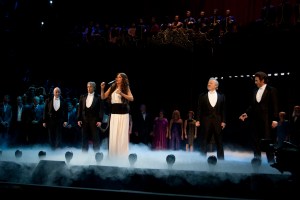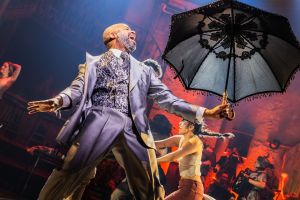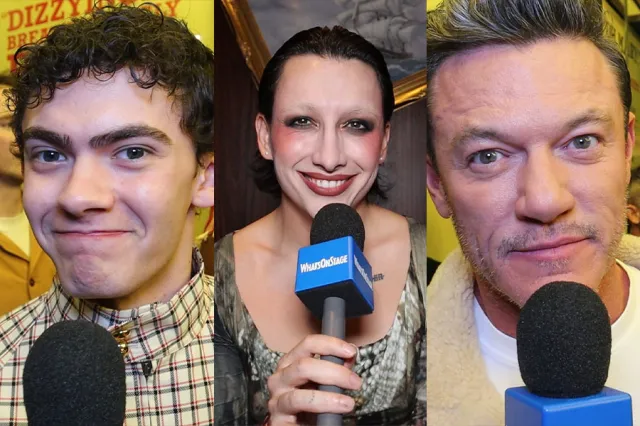More Midsummer Madness & Lighting Awards
Is this the best time of year? Wimbledon tennis, strawberries and cream, occasional bursts of sunshine. And summer parties. There’s a big family gathering in Leeds this weekend for a barmitzvah, so I shall acquire a holiday mood on the lunchtime train from King’s Cross and dive into the hotel pool before dinner.
What do you give a boy for a barmitzvah these days? Tickets for Shrek? A new girlfriend? The poor lads used to be inundated with fountain pens and wrist watches. Now it’s more likely to be an iPad or money for golf lessons.
There was a time when every young boy wanted to be Bobby Charlton (my hero) or Ted Dexter. The new sporting idol — this month, at any rate — is the astonishing young Ulsterman Rory McIlroy, who stormed the US Open Golf Championship last weekend.
So it won’t be just golf lessons on the gift list: sets of clubs and a trophy cabinet will be featuring, too, I imagine.
It always intrigues me as to how people fall into their work or vocation. I mean, how do you becomes a lighting designer, for instance? The Variety critic David Benedict told me over lunch this week that he gave Paule Constable — most brilliant and poetic of lighting designers — her very first job as a backstage skivvy when he was running Gay Sweatshop in the late 1970s.
And what about Benedict himself? He was an actor for many years before becoming a critic. He’s very much an “insider” critic, too, not so much cultivating friendships with many professionals as continuing them. One of his best friends, for instance, is the playwright Bryony Lavery, and it’s sometimes disconcerting to be introduced on a first night to, say, Catherine Tate, or even Ian McKellen.
Is this a bad place for a critic to be? Friends with the enemy? (Critics love actors, and often their company, but the feeling’s far from mutual.) In David’s case, though, it gives him a unique position of strength, as he translates the trust of insiders into a position of authoritative participation, in their eyes, at least.
His reviews, always well written, are dispensed and received as notes to the production team. You may think this amounts to a dereliction of impartial critical duty. I think it’s an invaluable service, and a unique function, and it makes a very refreshing change from the rest of our critical clamour. And it’s particularly apt, of course, that he provides this service in a trade paper.
One thing David’s particularly good on is voice. And that’s because he’s a singer. A superb bass singer, in fact, and member of an unaccompanied choir called Coro, who perform rare and baroque music, carols and folk songs, all over Europe. They’ve even won an international competition in Estonia, where choral singing is a very big deal indeed. Coro’s next concert is on Saturday week (2 July) in St Paul’s, Knightsbridge, and they will be singing Britten, Weelkes and Schutz, among many others. If I wasn’t already booked into a play at the Royal Court, I’d go along myself.
Anyway, this is all by way of saying that our lunch together this week, in the Belvedere in Holland Park, was a midsummr highlight. We were gathered to discuss the past year’s theatre lighting for an award given by Clay Paky, the big international suppliers to the lighting industry in films, television and theatre.
Our fellow jurors, convened under the chairmanship of designer Mark Jonathan, were Jenny Gilbert of the Independent on Sunday, Louise Levene of the Sunday Telegraph, Fiona Maddocks of the Observer and Ash Khandekar of Opera Now. Can you imagine the six of us gabbing away for the best part of three hours on stage lighting? Well, we did, and I haven’t had so much fun at lunchtime since last year’s meeting. The food was pretty good, too.
But even that merry occasion was topped for me at the Times Literary Supplement party last night. I walked into the editor’s house — conveniently situated ten minutes away from mine — to be told that my Ken Campbell book had been reviewed (percipiently and therefore favourably) in this week’s issue, and that I could help myself to free copies by the front door.
This review by a King’s College English professor, John Stokes, is in fact a superb and slyly inflected mini-essay on what “made” Campbell as a character — his background, his persona, his voice, his reading. Stokes is a man of parts — he’s written books about Oscar Wilde and Eleanor Marx, for starters — and he wrote a lovely essay on Noel Coward and the French theatre in a celebratory volume about the playwright to which I also contributed.
This morale booster has almost compensated for the lack of reviews elsewhere. Not since Benedict Nightingale‘s rave review in The Times two months ago have I read so much as a peep, apart from a few on-line appreciations and a nice nod from Mark Shenton in a theatre programme.
Come on, guys: it’s not me who needs acknowledgment, it’s Campbell and his special place in our recent theatre history. We have the best theatre in the world. But it’s never discussed in the media outside of the review columns, and theatre books are way down the list of most literary editors’ priorities.
There was a good theatrical turn-out at Peter Stothard’s TLS party, though. No sign of Stokes, but I brushed shoulders with Antonia Fraser, Ken Cranham, literary agent Ed Victor, Cambridge don and star blogger Mary Beard, editor and biographer Jeremy Treglown (the best Bottom I ever saw, in a student production) and broadcaster Russell Davies (a delightful Starveling in that same student production; oh, all right, yes, I was a fairy, too, and far from definitive).
The tennis at Wimbledon is hotting up nicely as a background to all our summer activities. And I just hope the rain holds off for the Sunday matinee of Doctor Faustus at the Globe, which should round the weekend off very nicely, thank you.












